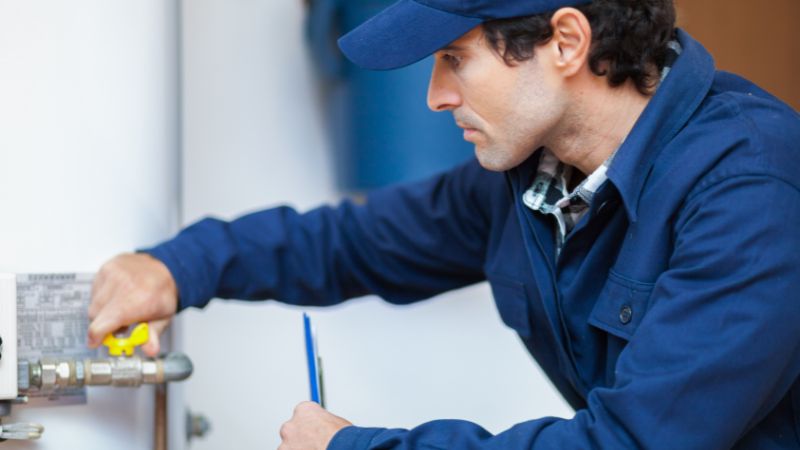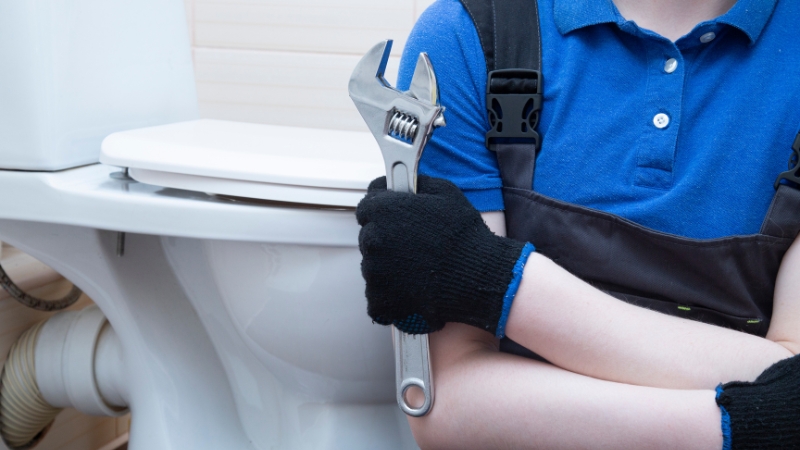Maintaining your plumbing system with frequent maintenance and drain cleaning by a professional plumber is vital for preventing costly repairs and ensuring its optimal condition. Regular preventive plumbing maintenance, including cleaning and inspections by a professional plumber, not only safeguards your property from potential water damage but also extends the lifespan of your plumbing fixtures and sewage system. In this post, we’ll delve into the benefits of preventive plumbing maintenance, offering valuable insights on how to schedule and plan for these essential tasks, including cleaning water faucets, and maintaining the sewage system and appliances. By understanding the significance of backflow prevention devices and frequent maintenance visits, you can effectively safeguard your home from unexpected plumbing issues.
Table of Contents
ToggleUnderstanding The Importance Of Preventive Plumbing Maintenance
a. Reducing Risk of Major Issues
Preventive plumbing maintenance is crucial for reducing the risk of major issues that can cause inconvenience and costly repairs. By scheduling regular inspections and maintenance, you can plan and catch small problems before they escalate into significant plumbing disasters. For example, a minor leak in household plumbing, such as a pipe or faucet, may seem insignificant at first but could lead to extensive water damage if left unattended.
Investing time and resources into preventive maintenance allows you to address these small plumbing needs promptly, preventing them from turning into larger, more expensive household plumbing problems down the line.
b. Essentiality of Preventive Maintenance
Understanding why preventive plumbing maintenance is essential involves recognizing that it’s not just about fixing things when they break; it’s about preventing them from breaking in the first place. Regular check-ups, frequent maintenance, and proactive measures help ensure that your plumbing system continues to function efficiently without unexpected disruptions.
For instance, inspecting household plumbing drainage systems for clogs or leaks on a routine basis can prevent instances where drains back up or burst pipes occur unexpectedly. This kind of proactive approach keeps your plumbing system running smoothly while also avoiding potential health hazards associated with unsanitary water backups.
c. Long-term Cost Savings
The long-term cost savings associated with investing in preventive maintenance for household plumbing cannot be overstated. While some homeowners might view preventive maintenance of household plumbing as an unnecessary expense, the reality is quite different. By addressing minor issues early on through scheduled inspections and upkeep, you avoid having to deal with major repairs that often come with hefty price tags.
Consider this: replacing worn-out seals or tightening loose fittings during routine checks costs significantly less than repairing extensive water damage caused by a neglected leaky pipe over time. In this way, preventive plumbing maintenance not only saves money but also provides peace of mind knowing that your home’s plumbing infrastructure is well-maintained.
Creating Your Plumbing Preventive Maintenance Schedule
a. Personalized Approach
When creating your preventive maintenance schedule, it’s essential to take a personalized approach. Start by assessing the specific needs of your plumbing system. Consider factors such as the age of your pipes, water quality, and the frequency of usage. For instance, if you live in an area with hard water, you might need more frequent maintenance to prevent mineral buildup.
Factor in any previous plumbing issues you’ve experienced. If there have been recurring problems like leaky faucets or clogged drains, make sure to include targeted tasks in your schedule to address these issues proactively.
Consider creating a checklist that covers all areas of your plumbing system: from checking for leaks and inspecting exposed pipes for signs of corrosion to testing water pressure and examining the condition of seals and gaskets.
b. Organizing Maintenance Tasks
To effectively plan and organize your plumbing maintenance tasks, break them down into manageable chunks based on their frequency and complexity. Start by listing routine tasks that should be performed monthly or quarterly, such as checking for leaks or inspecting visible pipes for signs of damage.
Then, identify semi-annual or annual tasks like flushing water heaters or conducting sewer line inspections using a camera scope. By organizing these tasks according to their frequency, you can create a structured schedule that ensures no important maintenance activities are overlooked.
Consider using digital tools like calendar reminders on your smartphone or computer to help keep track of when each task needs to be completed. This way, you’ll receive notifications when it’s time to perform specific preventive maintenance activities without having to rely solely on memory.
c. Effective Scheduling Tips
When setting up an effective plumbing preventive maintenance schedule, consider staggering different types of tasks throughout the year rather than trying to tackle everything at once. For example:
- In springtime: Focus on outdoor plumbing fixtures such as sprinkler systems and outdoor faucets.
- During fall: Prepare for colder weather by insulating exposed pipes and ensuring proper drainage around your home’s foundation.
- Before winter sets in: Service hot water heaters and check indoor pipes for insulation adequacy against freezing temperatures.
Determining The Right Frequency For Plumbing Maintenance
a. Factors to Consider
Several factors should be taken into account. Firstly, consider the age of your plumbing system. Older systems may require more frequent maintenance due to wear and tear over time. If you live in an area with hard water, mineral buildup can occur more rapidly, necessitating more frequent checks and cleanings. Furthermore, the number of occupants in your home also impacts maintenance needs. A larger household typically puts more strain on the plumbing system, requiring more regular upkeep.
It’s essential to assess your plumbing system’s needs for regular maintenance by conducting a thorough inspection. Look for signs of leaks, corrosion, or slow drainage as these indicate underlying issues that need attention. Checking the pressure gauge is crucial as well; fluctuations in water pressure could signal potential problems within the pipes or fixtures. Moreover, keep an eye out for any unusual odors emanating from drains or visible signs of rust on exposed pipes.
b. Finding Balance
Finding balance between over-maintenance and neglecting your plumbing system is crucial for its longevity and efficient operation. Over-maintenance can lead to unnecessary expenses and disruptions while neglect can result in severe damage that requires costly repairs.
To avoid over-maintenance or neglecting your plumbing system altogether:
- Keep a detailed log of all maintenance activities performed.
- Follow manufacturer guidelines regarding scheduled inspections and service.
- Be attentive to any changes in water quality or pressure which might indicate underlying issues.
Identifying And Addressing Common Plumbing Problems Early
a. Recognizing Potential Plumbing Problems
Early signs of hidden leaks or blockages are crucial indicators of potential plumbing issues. Look out for damp spots on walls, ceilings, or floors, as they may signify hidden leaks. Slow drainage in sinks or showers could indicate the presence of blockages.
Minor issues such as dripping faucets should not be overlooked either. They might seem insignificant, but they can lead to more severe problems if left unattended. Keep an eye out for these signs to catch potential plumbing problems early.
b. The Importance Of Prompt Action
Addressing plumbing issues promptly is vital in preventing them from escalating into major problems. If left unchecked, a small leak can result in extensive water damage and mold growth. Similarly, a minor clog can lead to sewer backups and costly repairs.
Taking prompt action not only prevents further damage but also saves you from hefty repair bills down the line. By addressing common plumbing problems early on, you can avoid inconvenience and financial strain.
c. Tips For Early Intervention
Regularly inspect your plumbing fixtures and pipes to identify any potential issues before they worsen. Tighten loose fittings, replace worn-out washers promptly, and clear debris from drains to prevent clogs.
Consider installing drain strainers to catch hair and debris before they cause blockages in your pipes. Moreover, keeping an eye on your water bill is another way to detect hidden leaks early; a sudden increase could signal an underlying issue that needs attention.
Seasonal Plumbing Maintenance Tips
a. Weather Impact
Weather changes can have a significant impact on your plumbing system. During winter, pipes are prone to freezing, leading to potential cracks or bursts. To prevent this, insulate exposed pipes and allow faucets to drip during extremely cold temperatures.
In the spring and summer, heavy rainstorms can overwhelm your drainage system, causing backups and flooding. Ensure that gutters and downspouts are clear of debris to direct water away from your home’s foundation. This helps prevent water damage and basement flooding.
b. Adjusting Preventive Maintenance
Adjusting plumbing maintenance routines based on seasonal demands is crucial for a well-functioning system throughout the year. For instance, in the fall, focus on clearing leaves from outdoor drains and inspecting sump pumps before the wetter months arrive.
During the summer months, pay attention to any signs of leaks or drips as they may indicate issues with increased usage due to activities like watering lawns or filling swimming pools. Regularly check for leaks around hose bibs and outdoor faucets.

Extending The Lifespan Of Your Plumbing System
a. Preventive Measures
Preventive measures play a crucial role in increasing the longevity of your household plumbing. By scheduling and planning for preventive plumbing maintenance, you can ensure that your pipes and fixtures remain in optimal condition for an extended period. Regular maintenance helps identify potential issues early on, preventing them from developing into major problems that could significantly impact the lifespan of your plumbing system.
Proper care and maintenance are essential factors in prolonging the life of your pipes and faucets. Regularly checking for leaks, monitoring water pressure, and addressing any issues promptly can prevent small problems from escalating into larger ones. For instance, fixing a minor leak in a timely manner can prevent water damage to walls or floors, ultimately contributing to the overall health of your plumbing system.
b. Benefits Of Maintenance
In the long run, investing time and effort into preventive plumbing maintenance yields numerous benefits for homeowners. It not only helps avoid costly repairs due to neglect but also contributes to environmental conservation by reducing waste, such as water loss from undetected leaks. Moreover, maintaining your plumbing system ensures that it operates efficiently over time while minimizing disruptions caused by unexpected breakdowns.
Regular inspections also involve checking the condition and age of components like anode rods within water heaters. This proactive approach allows homeowners to replace aging parts before they fail completely, thereby extending their useful lifespan. By staying ahead with preventive measures rather than waiting for things to break down, homeowners can enjoy peace of mind knowing that their plumbing system is well-maintained.
Water Quality’s Role In Plumbing Maintenance
a. Understanding Water Quality’s Impact
The quality of water directly influences the health and longevity of your plumbing system. Poor water quality can lead to corrosion, mineral buildup, and damage to fixtures. For instance, hard water, which contains high levels of minerals like calcium and magnesium, can cause mineral deposits in pipes and on faucets. These deposits can restrict water flow and lead to clogs.
Maintaining good water quality is essential for preventing a host of potential plumbing issues. By minimizing exposure to contaminants, you can reduce the likelihood of damage to your pipes and fixtures. Regularly inspecting your water supply for signs of impurities or discoloration is crucial for identifying any problems early on.
b. Tips For Preventive Maintenance
To maintain good water quality, consider installing a whole-house filtration system or using point-of-use filters at individual taps. These systems help remove impurities such as sediment, chlorine, or other harmful substances that may affect your plumbing over time.
Preventive measures also include being mindful about what goes down your drains. Avoid using harsh chemical-based drain cleaners as they can negatively impact water quality by introducing harmful substances into the wastewater stream.
Regular maintenance should involve checking for any visible signs of contamination or deterioration around water faucets or fixtures in addition to monitoring changes in your water bills that might indicate leaks or excessive usage.
Consulting Professionals For Expert Maintenance Advice
a. Benefits of Professional Advice
Seeking professional advice for preventive plumbing maintenance is crucial. Professional plumbers possess the expertise and experience to identify potential issues before they become major problems. Their insights can help you avoid costly repairs in the future.
Professional plumbers can conduct thorough inspections during maintenance visits to assess the condition of your plumbing system. They are trained to recognize signs of wear and tear, corrosion, or leaks that could lead to significant damage if left unattended.
By engaging with the preceding section about “Water Quality’s Role in Plumbing Maintenance,” it’s important to note that professional plumbers can offer recommendations based on their assessment of your system’s needs. For instance, if they detect hard water issues affecting your pipes, they might suggest installing a water softener as part of your preventive maintenance plan.
b. Valuable Insights From Experts
Seeking advice from professional plumbers is even more critical. The high usage and demand on office plumbing systems necessitate frequent maintenance and upkeep. Expert plumbers understand the strain that constant usage places on these systems and can tailor their recommendations accordingly.
Moreover, professional plumbers have access to resources such as manufacturer guidelines and industry best practices that may not be readily available to an average customer or office staff member. This means they can provide comprehensive recommendations backed by solid knowledge and documentation.
Expert advice extends beyond just identifying current issues; it also involves proactive planning for future maintenance needs. By partnering with a knowledgeable team of professionals, you can establish a customized preventive plumbing maintenance schedule tailored specifically for your office’s requirements.
The Perfect Approach To A Well-Maintained Plumbing System
a. Regular Inspections
Regular inspections are crucial to maintaining a well-functioning plumbing system. By conducting routine checks, you can identify and address potential issues before they escalate into costly problems. For instance, inspecting your pipes for leaks or corrosion can help prevent water damage and mold growth in your home. Checking the condition of your sewage system ensures that it operates efficiently, reducing the risk of backups and clogs.
When performing regular inspections, be sure to examine all areas of your plumbing system, including toilets, drains, and appliances such as water heaters and washing machines. Pay close attention to any signs of wear and tear or unusual noises that may indicate underlying issues. By staying proactive with these inspections, you can catch minor concerns early on and avoid major disruptions to your household.
b. Cleaning And Maintenance
Routine cleaning is another essential aspect of preventive plumbing maintenance. Clearing out debris from drains and removing mineral buildup from faucets not only promotes optimal performance but also extends the lifespan of your fixtures. For example, cleaning aerators in bathroom faucets helps maintain strong water pressure while preventing sediment accumulation.
Moreover, incorporating regular maintenance tasks like flushing water heaters can enhance their efficiency by eliminating sediment that hinders heat transfer. This simple practice contributes to consistent hot water supply throughout your household while preventing premature appliance failure.
In addition to these tasks, consider scheduling professional drain cleanings at least once a year to keep sewer lines clear from obstructions caused by human waste or other materials. This proactive approach minimizes the likelihood of sewage backups which could lead to extensive property damage if left unaddressed.
c. Consistency Is Key
Staying consistent with a plumbing maintenance routine is vital for preserving the integrity of your entire system over time. One way to ensure consistency is by creating a schedule for specific maintenance tasks such as changing filters or testing shut-off valves regularly. This approach helps prevent oversight due to busy schedules or forgetfulness.
Furthermore, keeping track of when different components were last serviced allows you to anticipate future needs more effectively while avoiding neglect in certain areas. By prioritizing consistency in your preventive plumbing maintenance efforts through regular inspections, cleaning practices, and adherence to scheduled routines, you’ll significantly reduce the likelihood of unexpected breakdowns within your household’s plumbing infrastructure.
Conclusion
You’ve now grasped the significance of preventive plumbing maintenance and learned how to create a tailored schedule, determine the right frequency, identify common issues, and extend your system’s lifespan. By considering water quality and seeking professional advice, you’re well-equipped to maintain a robust plumbing system. Remember, a well-maintained plumbing system not only saves you from unexpected breakdowns but also ensures the comfort and safety of your home. So, take charge of your plumbing’s well-being and implement these proactive measures for a stress-free and efficient household.
Now armed with valuable insights, it’s time to put your knowledge into action. Start by crafting your preventive maintenance schedule and incorporating the tips discussed. Your proactive approach will pay off in the long run, safeguarding your home from plumbing woes. Keep your plumbing in top shape, and enjoy a worry-free living environment!
Experience Top-Notch Preventive Plumbing Maintenance with Garcia Home Restoration!
At Garcia Home Restoration, we recognize the importance of maintaining a healthy and efficient plumbing system in your home. Our team, known for their proficiency in Preventive Plumbing Maintenance, is committed to ensuring the longevity and reliability of your plumbing infrastructure. Our focus at Garcia Home Restoration goes beyond mere fixes; we strive to enhance the overall functionality and safety of your home’s plumbing system. We have built a remarkable reputation in Contra Costa County for our dedication to quality, our extensive knowledge of plumbing maintenance, and the trust we’ve established with numerous satisfied customers. Don’t let plumbing issues disrupt your home’s comfort and safety. Contact us today for exceptional Preventive Plumbing Maintenance services and enjoy the assurance of a well-maintained plumbing system in your home!




